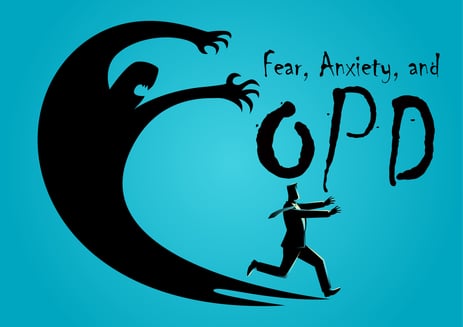Short Term Physical Effects of Anxiety
Anxiety is an instinctual response to real danger that kept our primitive ancestors from harm. It's the emotion at the heart of the fight or flight reaction. Some of the physical effects of anxiety are:
- Fluids are dispersed to different parts of your body. Keep in mind your lungs are 80% water so any fluid movement will affect breathing.
- Throat becomes dry
- Throat muscles tighten
- Muscles stiffen
- Liver increases glucose production heightening blood sugar levels
- Increased blood flow: this is the reason your skin may appear to pale or flush during stressful situations.
- Spleen discharges more red and white blood cells in an attempt to gather more oxygen
Long Term Physical Effects of Anxiety
- Indigestion
- Changes in metabolism
- More prone to ulcers
- Heart issues
- Suppressed immune function
- Insomnia
- Nervous system malfunction
- Less effective brain functions
Breathing is largely a muscular function so you can see that many of these effects threaten proper respiratory function. Anxiety makes your breathing quicker and more shallow amplifying the effects of an exacerbation. This makes you feel more short of breath and in turn, more anxious. When caught in this cycle, it will be very difficult for you to distinguish symptoms of anxiety from symptoms of your COPD. Finding different ways to deal with anxious feelings is likely to lessen effects of your breathing condition as well.
The same downward spiral can apply to depression. You want to avoid feeling short of breath so you decrease activities. This weakens muscles making you feel short of breath with even less activity so you get depressed which makes you do even less and on and on.
Awareness is a Positive Thing
 Being aware of your diseases isn’t the same as anxiety. Constant awareness can keep you on your treatment plan, help you recognize the onset of an exacerbation, and aids in knowing your body and determining when you need medical attention. Confusing anxiety with the natural shortness of breath that occurs with COPD may cause you to panic in a situation that is in your control, causing unnecessary trips to the doctor and added expenses. Anxiety and depression also can keep you from social gatherings and from doing activities that you love. Too much anxiety greatly diminishes your quality of life, but it doesn’t have to.
Being aware of your diseases isn’t the same as anxiety. Constant awareness can keep you on your treatment plan, help you recognize the onset of an exacerbation, and aids in knowing your body and determining when you need medical attention. Confusing anxiety with the natural shortness of breath that occurs with COPD may cause you to panic in a situation that is in your control, causing unnecessary trips to the doctor and added expenses. Anxiety and depression also can keep you from social gatherings and from doing activities that you love. Too much anxiety greatly diminishes your quality of life, but it doesn’t have to.
Medications to Treat Anxiety
Patients diagnosed with COPD are often prescribed an anti-anxiety medication. Be sure to follow proper precautions.
- It is imperative that you follow the directions exactly as prescribed for these medications because an overdose of these medications can cause a decreased rate of breathing, which makes your COPD worse.
- Another issue with taking a new medication is a negative interaction to medications you are already taking. Your pharmacist will cross-check your new medication with all your other prescribed medications to help prevent these issues.
- This is why it is so important that all your doctors are aware of what medications you are taking, and that you get your medications from the same pharmacy so that your drug profile is up-to-date and complete.
- As with most drugs, a dependence or addiction may become a problem. The good news is that there are also non-addictive medications that do not decrease breathing, as well as natural or alternative medicines that can be effective.
Pulmonary Rehabilitation
 Studies have shown that pulmonary rehabilitation, used in concert with medications increases effectiveness of treatment and slows the progression of many respiratory conditions. It also teaches patients more effective ways to deal with the emotional aspects of the disease.
Studies have shown that pulmonary rehabilitation, used in concert with medications increases effectiveness of treatment and slows the progression of many respiratory conditions. It also teaches patients more effective ways to deal with the emotional aspects of the disease.
Pulmonary rehabilitation is essentially an exercise program for your lungs. These programs educate you about your COPD and how to handle anxiety related to your COPD. They are also are a great networking opportunity to meet other people with COPD and how they handle anxiety related to their disease. Working together with respiratory therapists and pulmonary doctors you will get a customized rehabilitation program to help optimize your breathing and gain coping mechanisms for anxiety.
Breathing Retraining
A popular coping skill for dealing with anxiety related with your COPD is breathing retraining. It may sound unnecessary, but relearning your breathing techniques can help teach you how to relax, keep air moving through your body longer, make breathing not such a chore, and teach you how to slow your breathing down. All these techniques are natural defenses in calming anxiety related to your COPD. Some exercises that may assist with breathing retraining are:
- Yoga
- Tai Chi
- Diaphragmatic breathing techniques
- Pursed lip breathing
- Singing
- Playing the harmonica, or other wind instrument
Counseling and Therapy

Cognitive behavioral therapy is a type pf therapy that helps decrease anxiety through relaxation and breathing exercises, guided imagery, and also by learning coping skills.
Group counseling or support groups can help you learn from others about anxiety with COPD. The groups also reassure you that you are not fighting this alone and can lean on others with the same issues for support and help.
Support groups can be found through:
- Local churches or worship centers
- Rehabilitation clinics
- Respiratory hospitals
- Facebook or other online resources
Self-Analysis
Living with COPD involves recognizing anxiety triggers, determining how you respond, and learning ways to better cope with the stress. Stressors are events in everyday life that require an unexpected change. Here are some examples:
- Personal stressors: Lower self-esteem due to your COPD, change in habits such as sleep, nutrition, physical activity, or financial trouble due to increased medical bills
- Family and friends: difficulty having sex due to shortness of breath, conflicts with family or friends not understanding your physical limitations and lifestyle necessities.
- Work/Environment: struggles with normal activities such as grocery shopping, dressing, showering, cleaning, current living situation not conducive to the lifestyle change needed to address you COPD.
After recognizing what your stressors are, it’s time to face them head on. Some questions to ask yourself are:
- Are your stressors based on experiences or experiences you are afraid will happen?
- Are you dwelling on the possible negatives outcomes and expecting the worst?
- Am I prepared to deal with these stressors if one manifests itself?
One Day at a Time
It’s important to recognize that a lot of your anxiety related to your COPD is most likely worrying about what will happen. Instead of worrying, plan how you will handle the situation if it arises. Using this strategy increases confidence and quiets worrisome thoughts. Remember to focus on solving one problem at a time, one day at a time. Trying to tackle all of your stressors at once will only cause you more anxiety and reverse any progress that you have made.
Stay Away from the Blame Game
It’s OK to make mistakes along the way. When dealing with anxiety related to your COPD there are numerous possible solutions and it is crucial to discover which options will work for you. Be open to trying new techniques, weed out the treatments that you find ineffective, communicate and collaborate with your physicians, and enlist the help of your family and friends. The solution is there, it may just take some time to find it.
Stay Positive
Attitude is everything. Mental health is directly related to your attitude and how you  view life. A negative outlook can block your ability to think, and feelings of hopelessness and despair creep in. Recognize when your attitude isn’t where it needs to be, and give yourself a little pep talk and face the day with positivity.
view life. A negative outlook can block your ability to think, and feelings of hopelessness and despair creep in. Recognize when your attitude isn’t where it needs to be, and give yourself a little pep talk and face the day with positivity.
A sense of humor is important. Laughter is really the best medicine, it's not just a saying it has proven clinical benefits. Having COPD isn’t something you would chose if you had the choice, but the way you choose to deal with your COPD can make all the difference in the world. If you make a mistake, have a good laugh and move on.
Give Yourself a Break
With practice and patience, you will succeed in controlling your anxiety related to your COPD. It is impossible in life to have control over everything that happens to you, what you can control is the way you react to the situation. By maintaining a positive approach to life, you will succeed in tackling all your stressors and will be armed with the coping strategies to deal with any situation that comes your way.
Don't Cave to Unhealthy Coping Mechanisms
Sometimes when we're feeling anxious or depressed the allure of a quick fix is tempting. However, many of these things are likely to make your mood, as well as respiratory health suffer in the long run.
- Don't smoke
- Remember alcohol is a depressant
- Sweets and comfort foods lead to weight gain and suppressed lung function
- Inactivity weakens muscles and your overall health
1st Class Medical has a support group on Facebook where patients can support one another, ask questions and share information. You're are not fighting this battle alone! CLICK HERE to join the conversation now!




